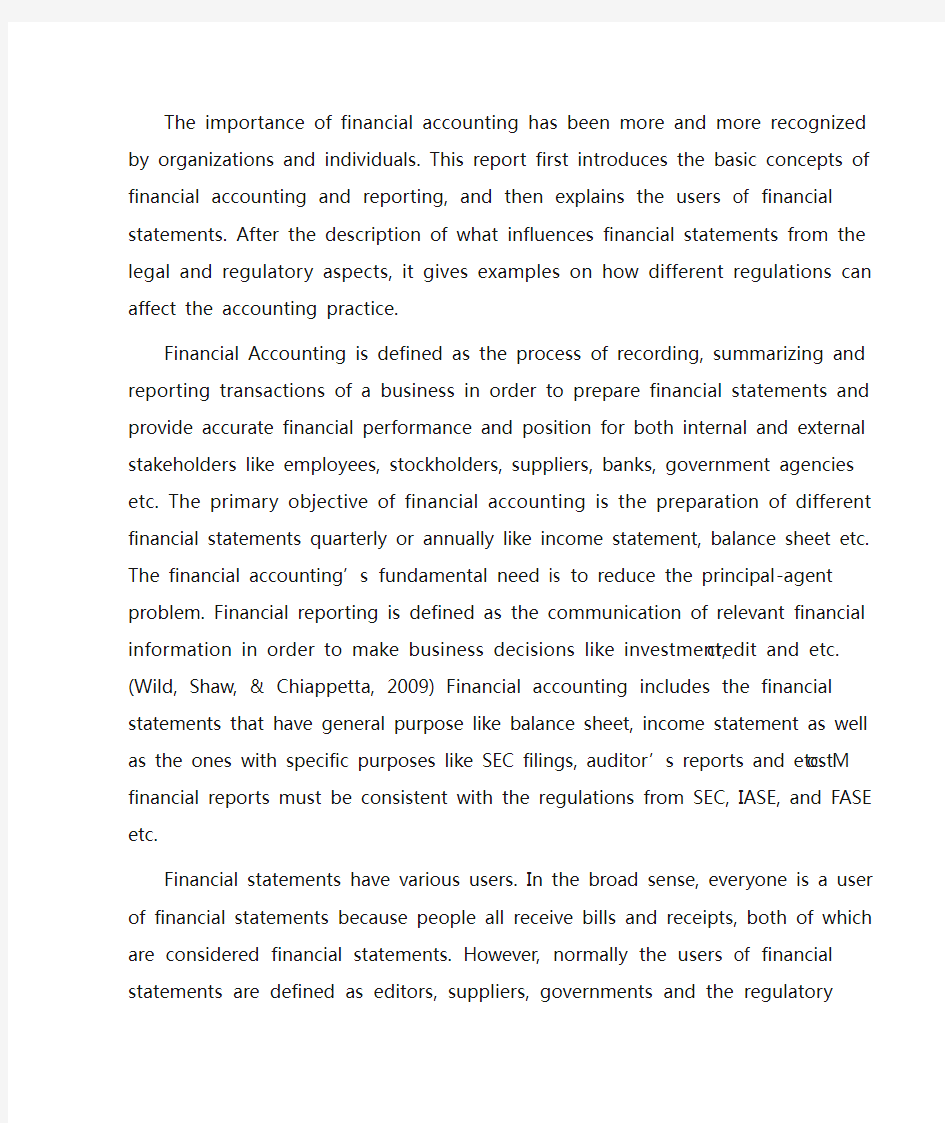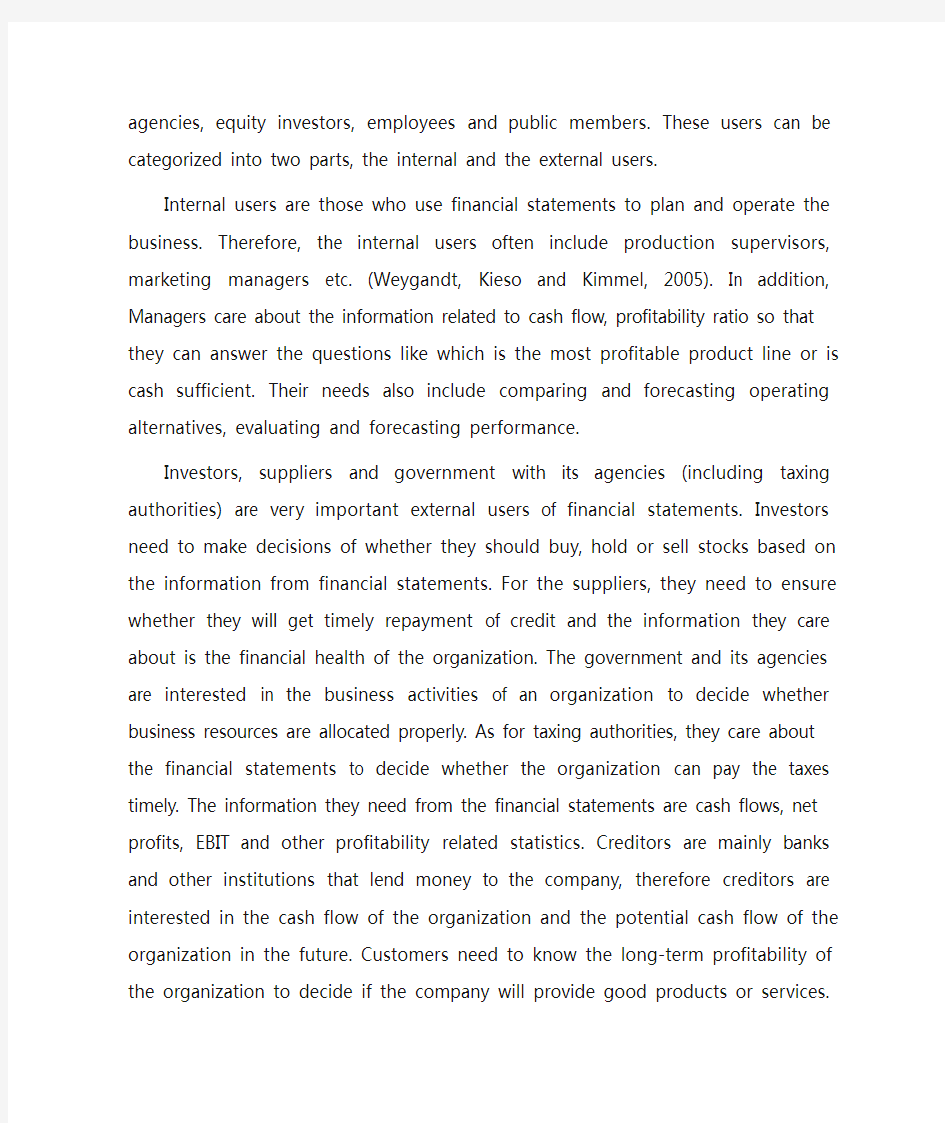financial statements


The importance of financial accounting has been more and more recognized by organizations and individuals. This report first introduces the basic concepts of financial accounting and reporting, and then explains the users of financial statements. After the description of what influences financial statements from the legal and regulatory aspects, it gives examples on how different regulations can affect the accounting practice.
Financial Accounting is defined as the process of recording, summarizing and reporting transactions of a business in order to prepare financial statements and provide accurate financial performance and position for both internal and external stakeholders like employees, stockholders, suppliers, banks, government agencies etc. The primary objective of financial accounting is the preparation of different financial statements quarterly or annually like income statement, balance sheet etc. The financial accounting’s fundamental need is to reduce the principal-agent problem. Financial reporting is defined as the communication of relevant financial information in order to make business decisions like investment, credit and etc. (Wild, Shaw, & Chiappetta, 2009) Financial accounting includes the financial statements that have general purpose like balance sheet, income statement as well as the ones with specific purposes like SEC filings, auditor’s reports and etc. Most financial reports must be consistent with the regulations from SEC, IASE, and FASE etc.
Financial statements have various users. In the broad sense, everyone is a user of financial statements because people all receive bills and receipts, both of which are considered financial statements. However, normally the users of financial statements are defined as editors, suppliers, governments and the regulatory agencies, equity investors, employees and public members. These users can be categorized into two parts, the internal and the external users.
Internal users are those who use financial statements to plan and operate the business. Therefore, the internal users often include production supervisors, marketing managers etc. (Weygandt, Kieso and Kimmel, 2005). In addition, Managers care about the information related to cash flow, profitability ratio so that they can answer the questions like which is the most profitable product line or is cash sufficient. Their needs also include comparing and forecasting operating alternatives, evaluating and forecasting performance.
Investors, suppliers and government with its agencies (including taxing authorities) are very important external users of financial statements. Investors need to make decisions of whether they should buy, hold or sell stocks based on the information from financial statements. For the suppliers, they need to ensure whether they will get timely repayment of credit and the information they care about is the financial health of the organization. The government and its agencies are interested in the business activities of an organization to decide whether business resources are allocated properly. As for taxing authorities, they care about the financial statements to decide whether the organization can pay the taxes timely. The information they need from the financial statements are cash flows, net profits, EBIT and other profitability related statistics. Creditors are mainly banks and other institutions that lend money to the
company, therefore creditors are interested in the cash flow of the organization and the potential cash flow of the organization in the future. Customers need to know the long-term profitability of the organization to decide if the company will provide good products or services. Besides, they need to know whether the organization will continue product warranties.
Legal and regulatory influences on financial statements mainly embodied in three aspects:
First, all the accounting work should base on the existing laws, including the accounting law, the company law, etc. This means that in order to make sure that the financial statement represents true and fair view of the business status, the manager or the accountant of a company must strive to follow all the related laws. It is also unethical if a company breaks laws to manipulate the revenue or misguide the investors, lenders or other report users.
Second, financial statements should follow the tax requirements. When preparing for tax returns, a company many pay more or less on tax according to the time that the transaction occurs or the money settlement takes place. Therefore, the tax impact cannot be ignored when choosing the method of accounting. For example, if cash accounting is used, and if a company will not make the cash payment until the next year, then this company cannot declare a tax deduction on this expense. This practice may mislead the investors and cause a jump in cash receipts. Instead, if the accrual method was used, and if there are many accounts receivables, the final financial report may look good in its level of income, but look bad in its cash or bank account. As we can see from the above examples, the tax impact may change a lot in a company’s accounting statement, especially for small and medium sized companies.
Third, company should be consistent with the accounting standards. Accounting standard is a principle guiding the accounting practices. Take the United States’ Generally Accepted Accounting Principles (known as GAAP) as an example. It is a widely used accounting standard, comprised of a set of accounting standards for every account, guiding how to prepare and present a company’s income and expense, assets and liabilities. It is not hard to find that, normally, different firms have different varieties of business activities and even firms in the same industry may have its own unique business. However, if every company has its own accounting way, it is hard for people to compare between firms. Fortunately, the emergence of accounting standards solved this problem, since it allows companies that using the same standard to record the business activities for the financial report based on the same principal as well as the same practice law.
